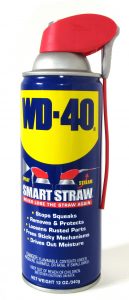
About to do your seasonal garage door maintenance? Nice. You know us – DIY garage door maintenance is never a bad idea (as long as you don’t touch the springs!); it saves you repair and replacement costs for your garage door, lengthens its life, and ensures quiet, smooth operation. And most of that is simply due to regular cleaning of the door’s parts and proper lubrication to follow up.
It’s natural to see a sea of metal components and have the urge to lubricate everything heavily, top to bottom. But this isn’t the place to give into that urge – you’ll end up doing more harm than good. Especially when it comes to the garage door tracks.
What Garage Door Parts Should & Should Not Be Lubricated
While most of the components of your garage door could use a little lubrication now and then, the tracks are a no-no. After cleaning all your garage door’s infrastructure, panels and fittings, the parts you should lubricate are:
- Rollers
- Hinges
- Pulley bearings
- Chains
- Latches
- Springs (only with spray lubricant to avoid handling them)
Why not lubricate the tracks, too? Won’t that mean even less friction? Surprisingly – no. This will actually gunk up your garage door tracks over time, which will eventually lead to problems like a crooked door, the garage door coming off track, being noisy, jerking motions, or even broken springs. Don’t do it! Give the tracks a good cleaning and leave them be.
What Kind of Garage Door Lubricant to Use
The Golden Rule of garage door lubrication is to never use WD40. WD40 is actually a solvent. While it’s a great tool for getting gunk and rust debris off a metal part, it needs wiped off after, as if left on it will eventually encourage rust and corrosion. So, no WD40. Standard oils and grease are also not the best options.
Approved garage door lubricants include:
White Lithium Grease
As opposed to regular grease, white lithium grease is made of an oil and soap mixture and is commonly found in spray cans, making it easier to use and cleaner than grease. Lithium grease is a great choice for garage door parts. It’s long-lasting, resistant to temperature fluctuations, and stands up to friction.
Silicone
Another great option for garage door lubrication is silicone-based lube. Silicone sprays work well on mechanical parts of many kinds. Like lithium grease, silicone withstands temperature fluctuations and lasts a long time. As an added bonus, it can penetrate difficult-to-reach spots and also makes the parts more resistant to water.These lubricants are easy to find at your local hardware store, or even in the home-improvement sections of many groceries. And as always, the garage door professionals at SACS are here to help when you need it – feel free to reach out with questions or to set up an appointment for us to handle your garage door tune up for you!
